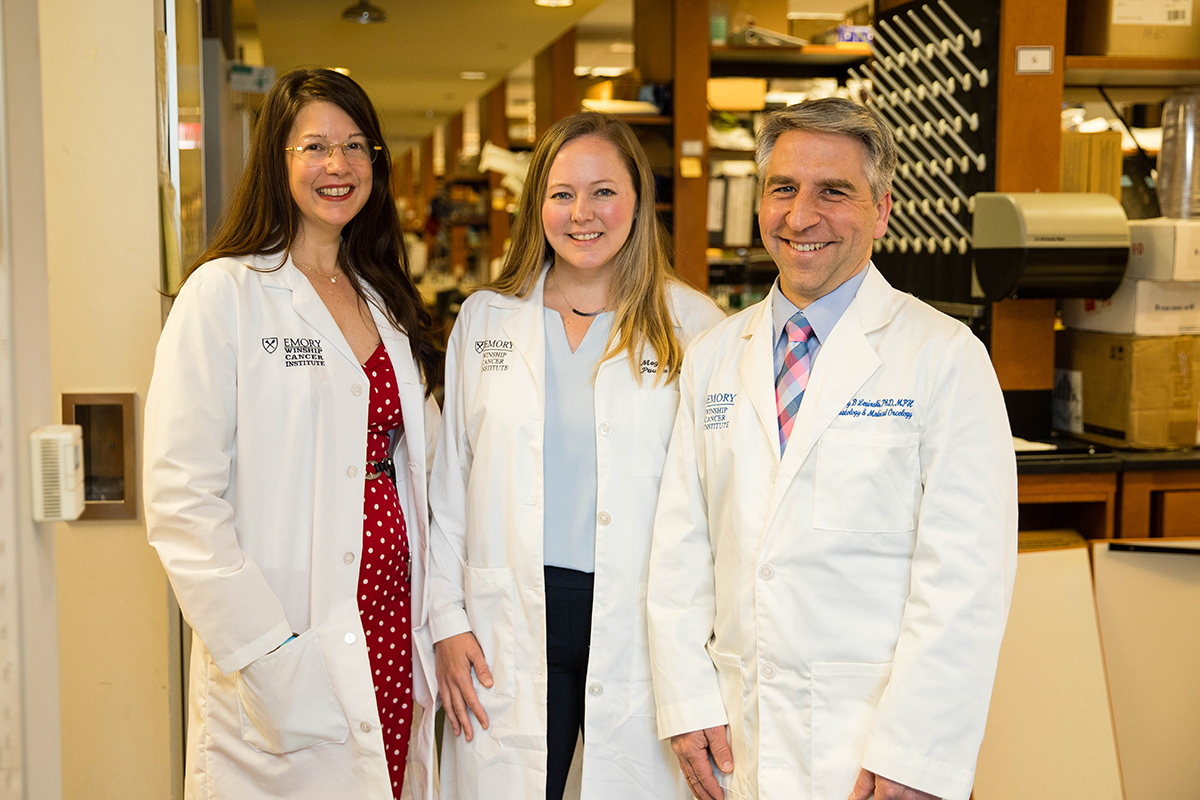
Study authors Chrystal Paulos, PhD, Megan Wyatt, MS, and Gregory Lesinski, PhD, MPH
An innovative study led by Megan Wyatt, MS, and her translational researcher teams in the laboratories of Chrystal Paulos, PhD, and Gregory Lesinski, PhD, MPH, at Winship Cancer Institute of Emory University has uncovered a simplified, economical manufacturing process for generating more potent and metabolically fit human T-cell therapies to treat solid tumors.
This cellular therapy uses immune cells called T-cells, a type of white blood cell, taken from the patient’s blood, changed in the laboratory by adding a gene for a chimeric antigen receptor (CAR) that recognizes tumor antigen. This strategy enables the T-cells to selectively target and attack cancer after they are given back to the patient.
Reported in Molecular Therapy,, the study revealed for the first time that 30-fold fewer magnetic beads (CD3/ICOS-activation beads) were needed to activate and multiply the number of T-cells for generating human anti-tumor CAR Th17 cells. Importantly, these cells were able to shrink large human mesothelioma tumors established in mice. The finding is important and, given that activation beads are expensive, potentially game-changing for improving accessibility of cell therapy.
The study suggests that using fewer of the activation beads could be cost saving if adapted for future clinical trials. Deeper mechanistic investigations used cutting-edge assays (lab tests to measure amounts of specific substances) to reveal that not only were the resulting cells less differentiated, but they possessed an optimal metabolic profile, making them more bioenergetically fit. The researchers also discovered that “less fit” CAR Th17 cells could be redirected with novel metabolic enzymes, thereby improving their ability to regress human tumors.
These findings are unique because most investigators use three times as many of the T-cell stimulating beads to generate CAR therapies. But this study finds that 30-fold less of them can actually generate a better and more potent CAR product. What’s more, replacing CD28 with ICOS further enhances the cytokine function, metabolism, and persistence of adoptively transferred CAR T-cells in mice bearing large tumors.
The clinical implication of this work is exciting, but refinement of this approach is needed to position it for clinical use. This study may convince pharmaceutical companies to use fewer beads while expanding their CAR products. Translational researchers also can use fewer activation beads to generate novel, cost-efficient and more potent T-cell products programmed to target specific cancer cells. These include CAR T-cells that zero in on specific targets on cancer cells, and experimental tumor-infiltrating lymphocytes (TILs) being developed to treat solid tumors.
"This work provides foundational data that shows a new methodology to simultaneously improve the efficiency, cost and quality of cell-based therapies in the setting of advanced cancer," says the study’s principal investigator Chrystal Paulos, PhD, director, Translational Research for Cutaneous Malignancies at Winship and the David H. Lawson Professor in Cancer Research at Emory University School of Medicine.
Paulos collaborated on this study with Winship Cancer Institute and Emory researchers in her lab Megan Wyatt, MS, Guillermo Rangel Rivera, Aubrey Smith, PhD, Amalia Rivera Reyes, Hannah Knochelmann, MD, PhD, Logan Huff, MD, Michelle Nelson, PhD, and Lillian Neal, MS, as well as with Gregory Lesinski, PhD, MPH, Winship’s associate director for basic research and shared resources and co-director of the Translational GI Malignancy Program; and Andrew Medvec, DO, and James Riley, PhD, from the University of Pennsylvania.
This work was supported by NCI R50 CA233168 (M.M.W.), NCI R01 CA228406 and R21 CA266088 (G.B.L.), NCI R01 CA175061 and R01 CA208514 (C.M.P.), and V Foundation for Cancer Research Translational Award T2021-015 (C.M.P.). This work was supported in part by the Flow Cytometry and Cell Sorting Shared Resource, Hollings Cancer Center, Medical University of South Carolina (P30 CA138313). This work was supported in part by Winship’s Cancer Center Support Grant (P30 CA138292).
